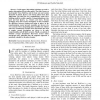Free Online Productivity Tools
i2Speak
i2Symbol
i2OCR
iTex2Img
iWeb2Print
iWeb2Shot
i2Type
iPdf2Split
iPdf2Merge
i2Bopomofo
i2Arabic
i2Style
i2Image
i2PDF
iLatex2Rtf
Sci2ools
108
Voted
DMIN
2009
2009
Fish or Shark - Data Mining Online Poker
In this paper, data mining techniques are used to analyze data gathered from online poker. The study focuses on short-handed Texas Hold'em, and the data sets used contain thousands of human players, each having played more than 1000 hands. The study has two, complementary, goals. First, building predictive models capable of categorizing players into good and bad players, i.e., winners and losers. Second, producing clear and accurate descriptions of what constitutes the difference between winning and losing in poker. In the experimentation, neural network ensembles are shown to be very accurate when categorizing player profiles into winners and losers. Furthermore, decision trees and decision lists used to acquire concept descriptions are shown to be quite comprehensible, and still fairly accurate. Finally, an analysis of obtained concept descriptions discovered several rather unexpected rules, indicating that the suggested approach is potentially valuable for the poker domain.
| Added | 17 Feb 2011 |
| Updated | 17 Feb 2011 |
| Type | Journal |
| Year | 2009 |
| Where | DMIN |
| Authors | Ulf Johansson, Cecilia Sönströd |
Comments (0)

